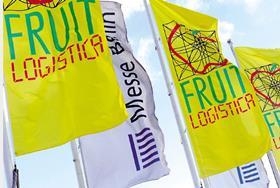
It has been confirmed that the South African fresh produce industry will again have a pavilion at Fruit Logistica in Berlin next February, but the scale of participation has been reduced dramatically after the South African government reduced its support.
'We have been forced to go it alone this year,' said Stuart Symington of the Fresh Produce Exporters' Forum (FPEF). 'We were informed at a fairly late stage that the government, and in particular the government’s Department of Trade and Industry (DTI), wanted to renegotiate its contribution. This would have been a long process, given the experience of past negotiations. We had no choice to fall back on the industry to save South Africa's participation at this coming Fruit Logistica.'
Eurofruit has been told that the budget and the scope of South Africa's participation has been cut by 50 per cent.
'We managed to secure significant contributions from Hortgro Services in the deciduous sector and SATI, the table grape organisation, as well as from four leading exporters who have taken up space at our stand,' said Symington. 'This has helped us to raise the minimum figure which was needed to save our participation.
'This is our tenth participation at Fruit Logistica in Berlin and we have managed to grow our presence over the years,' he added. 'This is a major setback, but we simply had to scale down or cancel.'
Symington noted that participation at Fruit Logistica was vital to maintaining South Africa's reputation as one of the leading fresh produce suppliers in the world. Earlier this year, he told Eurofruit that the DTI had increased its contribution and hinted that the coming event would have represented South Africa's biggest participation yet.
'We had to cut almost our entire marketing budget for the event,' Symington explained. 'It is a tribute to the resilience of the industry, in very difficult times, that it has been able to pull the rabbit out of the hat at the last moment.'
Symington said that the government decision came at a time when most players in the fresh produce export sector were reporting tougher international market conditions.
'We expect 2012 to be very tough and will have to focus our activities very sharply to maintain our position,' he said.
Citrus industry spokesman Justin Chadwick said the citrus sector could not make much of a contribution to the event because of commitments to expenditure onbio-diversity issues.
Earlier, Sandra Beatsen, FPEF member responsible for coordinating the South African presence in Berlin, had said the main priority was saving the South African pavilion: 'We cannot consider any additional marketing activities,' she noted.
The South African fresh produce sector has long been arguing that it is not receiving enough government backup for a sector which earns the country more than R12bn (€1.1bn) in foreign exchange and which is a significant employer of people in the rural sector.
All government support for export development in the fresh produce sector was phased out during the first half of the previous decade, and the little assistance which has been received since then is governed by so much red tape that relatively few people are making use of it.






No comments yet